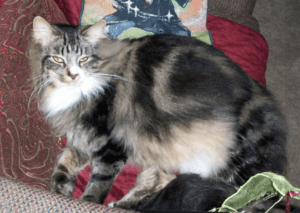What I Wish I’d Known Before Owning a Large Cat Breed
Although I adore dogs, I’ve been a cat owner most of my adult life. I rationalize this by reminding myself that, although dogs are typically more affectionate, loyal, and such good cuddle buddies, they are also a lot of work. They love being outdoors, going for runs and walks, and in my mind, require more attention and time than the average house cat.
So, you can imagine my slow, dawning bemusement when I adopted a cat almost 12 years ago, and found myself spending at least as much energy, effort, and time as I would have on a dog.
Enter Mister Biffles.
Growing up in the country, I’ve owned literally dozens and dozens of cats and dogs in my lifetime. Mister Biffles stands head and shoulders above the rest as the most unique pet I’ve ever owned. While I love stunning visitors and veterinary staff alike with twenty one pounds of Maine Coone glory, owning a cat this large and a pet this intelligent presents a unique set of challenges. I was all for meeting those challenges, but there are still a few things I wish I’d known prior to making a commitment this large and fluffy.
First, did I mention he’s twenty one pounds of cat? Because he is twenty one pounds of cat. While this is adorable and hilarious, it can also be other things, like expensive and messy. He’s a big boy with a big appetite, and the quantity and variety of food I would go through to keep him happy and healthy was not something I’d fully calculated at the time of adoption.
What goes up must come down, and what goes in… well, suffice to say, the litter box expenditures correlate directly to the food expenditures. Despite having one cat, I have two litter boxes. This helps both my pet and me feel a bit more at ease and less stressed about his bathroom habits. Is it necessary for every large breed of cat? Doubtful. But it can be useful, and in my case, necessary to keep a happy and healthy home.
I have a fenced in backyard, but Mr. B. spent the first 10 years of his life in a two bedroom apartment, and subsequently has zero desire to utilize this. However, he is, without a doubt, the most intelligent animal I’ve ever owned, and requires a certain amount of mental stimulation. Without the outdoors to aid in this, having multiple places for elimination, as well as hiding small caches of treats and food throughout the house help him feel more like the predator he is at heart. I’d never had to hide food or have multiple boxes for any one pet before. However, these efforts combined with catnip infused hiding spots, games of chase, and a plethora of toys help keep him entertained and stimulated.
While pet hair is not a problem unique to special breed owners, I should have kept in mind that this problem would grow with him in size. It was a journey of trial and error to find grooming products that he enjoyed enough to permit to be used on him, while simultaneously tackling that mass of glorious fur he totes around. Additionally, due to his size, bathing is another chore I hadn’t quite prepared myself for. Fortunately, I think he understands that I’m trying to help him, and will tolerate baths well enough, but again- he’s the first cat I’ve ever had to bathe regularly, making it another item on the list of things I wish I’d been prepared for.
Would I do it all again? For Mister Biffles, absolutely. But I do believe that my experience as a large breed owner will begin and end with him. The challenges that come with a larger cat are unique and at times unpredictable. It’s fair to say I entered into that contract without reading the fine print, but fortunately, none of it impacted my ability to be a doting and loving (or at least adequate, in his opinion) pet owner.
If you’re considering a specialty breed of any kind, whether cat or dog, large or small, fluff machine or hairless, I strongly encourage you to seek out the advice and experience of those who have successfully owned that breed in the past. Pet’s don’t understand the phrase “I didn’t realize,” and rehoming can be a traumatic experience for all involved. It’s best to know the pros and cons before bringing home your next furry family member.

Triage: Where Medicine Meets Mayhem (and You’re the Traffic Controller)
Triage: Where Medicine Meets Mayhem (and You're the Traffic Controller)Working in vet med means you wear a lot of hats - diagnostician, counselor, detective, animal whisperer. But one of the most underrated (and most stressful) roles? Triage Officer of Chaos. Whether...
Bloat in the Building: What Every Veterinary Team Member Should Know About GDV
Bloat in the Building: What Every Veterinary Team Member Should Know About GDVWhen a GDV case hits the clinic, the whole atmosphere changes. The clock ticks louder and the pace quickens. Everyone - from reception to recovery - has a role to play. Gastric...
Fourth of July: Celebrating our Vet Med Dependence
Fourth of July: Celebrating our Vet Med DependenceThis Independence Day, let's be honest: We're not exactly off the grid grilling hot dogs in flag shorts. Some of us are working. Some of us are on call. Some of us are pretending to enjoy fireworks while...
Vet Med Affirmations: Because You Deserve to Hear it
Vet Med Affirmations: Because You Deserve to Hear itWorking in vet med is not for the faint of heart; it's for the fierce, the compassionate, the caffeine-fueled warriors who do it all while dodging claws, cleaning "surprises," and explaining again why heartworm...
Wag Interrupted: The Tale of the Summer Tail Flop
Wag Interrupted: The Tale of the Summer Tail FlopIf your summer schedule is filling up with dogs who suddenly "won't wag their tail," you're not imagining it - swimmer's tail season is officially upon us. Every year, as the weather warms up and the lakes and...
Things We Say to Pets That Would Get us Fired if Said to Humans
Things We Say to Pets That Would Get us Fired if Said to HumansLet's be honest: working in vet med means having entire conversations with patients who can't talk back (well...except for that one Dachshund, and we don't talk about him anymore). Over time, we develop a...

